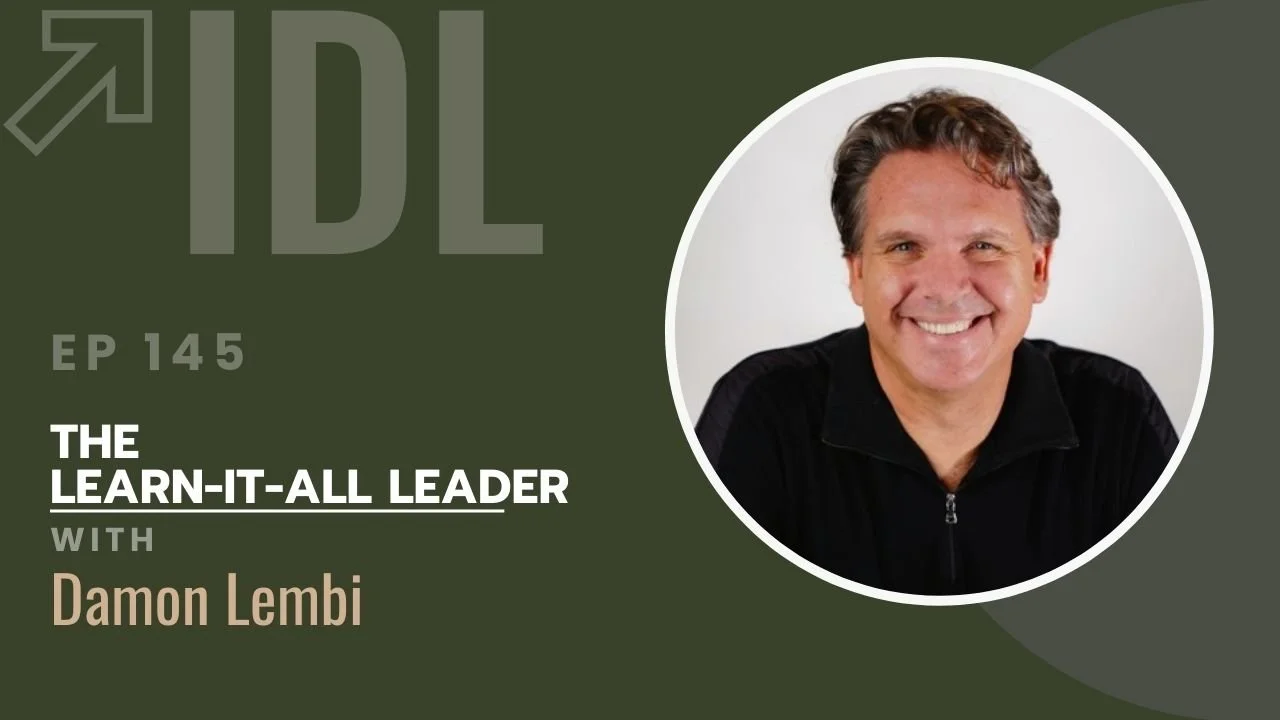IDL145 Season 3: the learn-it-all leader with damon lembi
Why is the ability to learn a crucial skill for every leader to have? If learning isn’t easy to do, how can you get better at doing it? How can you overcome impostor syndrome and allow yourself to learn without shame?
Hello and welcome back! We’re doing a special bonus episode! My guest today is Damon Lembi, the CEO of Learnit and the author of The Learn It All Leader. Together, we discuss the traits and tools of a learning leader, how to cultivate a learning mentality, and how to overcome imposter syndrome.
Meet damon lembi
For nearly three decades, Damon has led Learnit through the ever-changing L&D landscape, gaining insight into what works, how great leaders learn, and why learn-it-all companies outpace their competition.
Coming to business from a career in baseball, Damon brings an athlete’s perspective on leadership and training to his informal mentoring of executives. He’s distilled those hard-won insights into his bestselling book, The Learn-It-All Leader—Mindset, Traits, and Tools.
When he’s not working, you can find him making memories with his family, reading, seeing as much live music as possible, watching movies and ballgames, and walking Sausalito with his sidekick, Pablo the Puggle.
Visit Learnit and connect on Facebook, Instagram, Twitter, and LinkedIn.
IN THIS EPISODE WE DISCUSS:
You can’t be a leader without learning - 02:51
Learning takes place in real-time - 07:00
Build strong bridges - 10:10
Damon’s 3-step approach to overcoming impostor syndrome - 19:56
How to cultivate a learning mentality - 27:51
You can’t be a leader without learning
“Leaders have to continuously evolve, continuously learn and grow. If you feel like you have it all figured out and you’ve hit your ceiling, you’re gonna get passed by [others] … that’s why I tell a lot of individuals from the get-go that, really, I believe agility and the ability to learn is one of the top skills and most required skills today [for leaders] and in the future of work. ”
Leaders have to learn so that they can remain leaders. You will be surpassed by others who are open to learning, to being wrong, and to correcting and realigning their understanding if you don’t.
Leaders who learn are the ones who can continue to take care of their people because they are up to date with what’s going on in the world, they pursue knowledge as a source of value to boost their decision-making, and they listen to what’s being said around them.
By listening and learning, leaders can make informed decisions and execute powerful work.
Learning takes place in real-time
You can read books and watch documentaries, but you only really get practice in something new when you work at it in reality.
“When you roll up your sleeves and do the work, that tends to make the retention, the stickiness, and the learning from failures [sink in]. ”
Theoretical knowledge is important, but practical knowledge and attempts are where you can get your own, genuine data and experience and from there you can gather lessons and true understanding.
When you hire people into your company, hire for potential and for core values instead of only looking at their past experience because you can nurture your best-fit employees by hiring for value alignment and then training them yourself in your business.
Provide your people with learning opportunities, and safe spaces for making mistakes, and encouraging their talent and skill development.
“What I can do is bring people in, give them all a lot of learning opportunities, and then also give them the space to try new things, make mistakes, and coach them … I guess that’s our secret sauce for developing talent over the years.”
Build strong bridges
If you care for your employees and staff, the chances are very high that they will continue to speak highly of you if they move on to other companies.
These employees, no matter if they work for you or someone else, become the best “trojan horses” of business, spreading good words about you and your work to everyone they meet which ultimately boosts your name as well as the company’s reputation.
When you focus on building strong relationships and bridges with both your employees and fellow business owners, you don’t have the time to worry about people. Focus your energy on the positive instead of feeling insecure or suspicious.
“I think, as a leader, if you can go in … just believing in people and thinking that they have the best intentions, [only] if they prove you otherwise, you’re going to be in a much better position, and if you don’t you miss out on a lot of golden, great opportunities to work with individuals. ”
Damon’s 3 step approach to overcoming impostor syndrome
1 - Working hard: don’t cut corners. Don’t overwork, but work well and consistently
2 - Focus: hone in on your task at hand and be deliberate about it instead of procrastinating or going off in different directions
3 - Learn and let go: you’ve done the work, you have focused, and now you can take these aspects into your own hands and do your best.
If it goes well, great. If you fall on your face, then find out why and use that data in your next try so that you keep learning and growing instead of giving up at the first failure.
“You can learn from your failures and move forward [so] learn and let go and don’t be too hard on yourself. You gave it your best shot, you prepared, so let it fall where it may. ”
As Tyler recommends, separate yourself from the result.
“There are times when I’m absolutely going to fail, but if I’ve done the work, I’m focused and I’m prepared, then there is always something to learn from it if I separate myself and my ego, and my value from the result.”
How to cultivate a learning mentality
Be comfortable with change. Being comfortable with change requires two ingredients; self-confidence and vulnerability.
You need to be able to make and have trust in your decisions and then also be humble and ask for help or apologize when you need it or need to.
“Also realize that what might’ve worked five years ago doesn’t work now … So you’ve gotta evolve … Everything’s different and it’s going to continue being different.”
This is also why being able to learn is vital for leadership; what you used to do in the past may not be applicable to the present or the future anymore, so you will need to pivot.
Learning isn't easy, but you can actually learn how to do it. It’s an ongoing process.
This learning capacity isn’t only good for leaders, it’s good for employees as well. Learn how to be good at learning to pursue change, and push yourself to keep on going.
Resources, books, and links mentioned in this episode:
Visit Learnit and connect on Facebook, Instagram, Twitter, and LinkedIn.
BOOK | Adam Grant - Think Again: The Power of Knowing What You Don't Know
BOOK | Damon Lembi - The Learn-It-All Leader: Mindset, Traits and Tools
BOOK | David Dodson - The Manager's Handbook: Five Simple Steps to Build a Team, Stay Focused, Make Better Decisions, and Crush Your Competition
Level Up Your Leadership with the free 4 Days To Maximum Impact Course!
Sign up for the roundtable at: hello@theimpactdrivenleader.com
Check out the Practice Of the Practice
About the Impact Driven Leader Podcast
The Impact Driven Leader Podcast, hosted by Tyler Dickerhoof, is for Xillennial leaders who have felt alone and ill-equipped to lead in today's world. Through inspiring interviews with authors from around the world, Tyler uncovers how unique leadership strengths can empower others to achieve so much more, with real impact.
Rate, review and subscribe here on Apple Podcasts or subscribe on Stitcher and Spotify.



